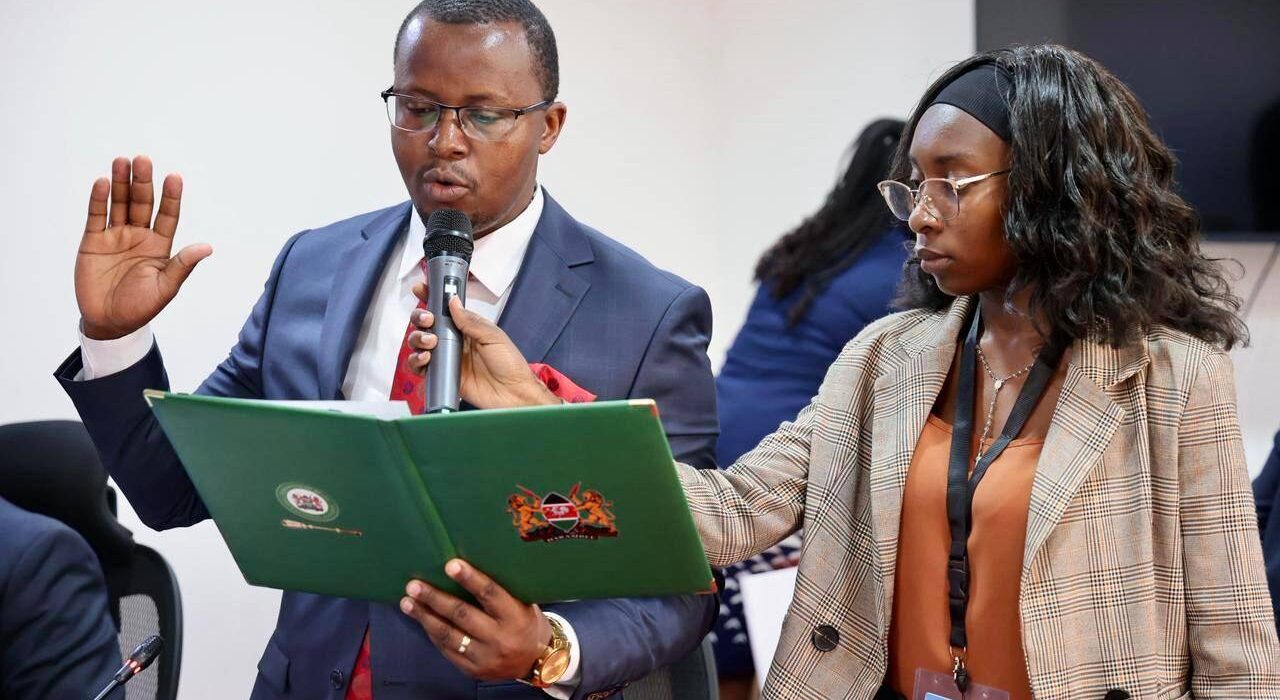Parliament has opened a sweeping inquiry into what members of the Public Investments Committee on Social Services, Administration, and Agriculture describe as one of the most alarming public land scandals to come before the House. The committee is investigating the alleged illegal subdivision and disposal of land belonging to the Kenya Veterinary Vaccines Production Institute, a state corporation central to the country’s livestock health and vaccine manufacturing ecosystem.
The inquiry, chaired by Vice-Chairperson Hon. Caleb Amisi, examined responses from KEVEVAPI Managing Director Dr. Alex Sabuni during a session in which lawmakers expressed outrage over the scale of land losses reported over several decades. The committee is reviewing both historical audit queries and persistent disputes surrounding the agency’s property, which have resulted in what lawmakers estimate to be the loss of nearly two-thirds of KEVEVAPI’s original land holdings.
Hon. Amisi told the management team that the seriousness of the matter goes far beyond routine oversight, describing the issue as a deeply entrenched scheme carried out over many years. He warned that the committee intended to establish who authorized the subdivision, how the mother title was handled and who ultimately benefited from the disposal of public assets. His remarks framed the inquiry as a test of Parliament’s resolve to confront entrenched land cartels.
The committee was informed that KEVEVAPI had originally been allocated 93.3 hectares. In December 1994, a former managing director allegedly sought consent to subdivide the land into nine separate parcels. According to KEVEVAPI’s testimony, this action was taken without approval from the parent ministry or the National Treasury. The parcels were later transferred to private developers and, despite multiple follow-up efforts, had not been recovered as of June 30, 2017.
A similar pattern of irregularity emerged around KEVEVAPI’s Embakasi property, where the land has undergone progressive shrinkage despite a lack of institutional approval for any subdivision. Initially measured at 93.02 hectares, the land reportedly reduced to 77.7 hectares, then to 45.2 hectares and currently stands at 29.05 hectares. Lawmakers described the pattern as a well-orchestrated series of actions that suggested a long-term plan to fragment and dispose of public land systematically.
Committee member Hon. Owino called the sequence of events a direct abuse of office and insisted that the KEVEVAPI board should not be insulated from accountability. He argued that the irregularities could not have unfolded over many years without the involvement or negligence of individuals entrusted with safeguarding public assets. His comments underscored the committee’s intention to test the strength of institutional controls that should have prevented such losses.
Dr. Sabuni defended the institution’s position, stating that KEVEVAPI had never authorized, sanctioned or approved any subdivision or disposal of its land. He maintained that at no point did the board delegate authority to the managing director for such actions, suggesting that the transactions were carried out through processes beyond the institution’s formal governance structures.
He informed the committee that KEVEVAPI had lodged complaints with the Ethics and Anti-Corruption Commission and initiated legal action based on the findings of the Ndung’u Commission Report. The report had listed beneficiaries of irregular allocations, giving the institution a basis for recourse. Despite these efforts, KEVEVAPI has faced slow progress in recovering lost land, constrained by lengthy litigation, entrenched interests and the complexity of property records going back decades.
The inquiry also revealed that the original title deed for the contested land had been surrendered to Kenya Commercial Bank as collateral for a 30 million shilling loan. KEVEVAPI management noted that the property was never used to settle the debt, raising additional questions about how the title was handled and whether the bank’s custody may have contributed to subsequent irregular actions.
KEVEVAPI is currently involved in four court cases over the remaining 29.05 hectares at Embakasi. Dr. Sabuni reported that the institution had already won three of the cases, with the latest ruling now under appeal. He said the ongoing legal battles reflect the agency’s commitment to reclaiming its land and preventing further encroachments on public property.
Lawmakers directed KEVEVAPI to prepare a comprehensive historical record detailing all authorizations, correspondence, recoveries pursued and decisions relating to the disputed parcels. Hon. Amisi stressed that the committee was prepared to pursue accountability regardless of the status or influence of individuals implicated in the alleged land grab. He noted that Parliament had a responsibility to protect public assets and safeguard the country’s institutional integrity.
Beyond the land dispute, the committee also examined historical audit concerns raised by the Auditor General. These included a 104 million shilling debt owed by the Ministry of Agriculture and the challenges KEVEVAPI faces in collecting cross-border debts from Uganda and Rwanda. Management said the institution had withheld land rate payments based on the original acreage, pending finalization of ongoing legal disputes and clarity on the true size of its land.
The inquiry into the KEVEVAPI land dispute has drawn significant public interest given the strategic role the institution plays in producing vaccines for the country’s livestock sector. KEVEVAPI is responsible for supplying vaccines for diseases such as foot-and-mouth, lumpy skin disease, anthrax and Rift Valley fever. Its ability to operate effectively is directly linked to the availability of adequate land for production facilities, research, quality control laboratories and bio-secure isolation zones required for vaccine development.
The loss of land over the years has raised concerns about the long-term viability of the institution’s operations. Lawmakers noted that the progressive fragmentation of KEVEVAPI’s property could compromise its capacity to scale up production, respond to disease outbreaks or maintain bio-safety standards. They argued that the dispute underscores broader risks facing public institutions whose land holdings have been eroded through irregular allocations.
Parliament’s inquiry is expected to produce a comprehensive report outlining findings, identifying accountability gaps and recommending steps for land recovery and policy reforms. The committee has signalled that it will seek cooperation from investigative agencies to ensure that the matter is pursued beyond administrative review and addressed within the criminal justice framework where necessary.
As the investigation continues, the KEVEVAPI case is emerging as a focal point in Kenya’s broader struggle to protect public land and uphold accountability in state agencies. Its outcome is likely to influence future oversight practices, shape reforms on public asset protection and set a precedent for handling long-running disputes involving state-owned land.





